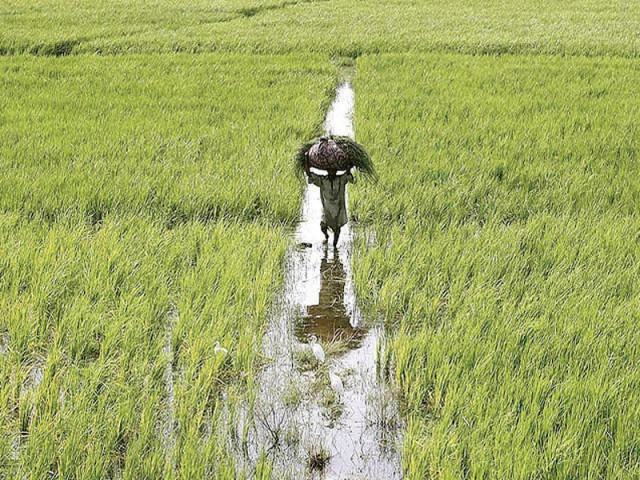Bumper harvest: Heavy rains raise prospects for rice crop
Production targets may not be missed; some believe they might be surpassed.

Until recently, farmers feared that the 6.1 million tons production target for rice, Pakistan’s second-largest export product, would be missed by a considerable margin this year. Much to their relief, the recent and heavy rains have resulted in improved availability of water – an important input for the crop. Paddy farmers are now hopeful of recouping some of their losses and of crossing the 5.5 million tons mark in the current year.
The estimates are provisional, as the crop has still around a month to reach maturity. Some growers express greater optimism: they feel that production may even cross six million tons, as dams and rivers have filled up with water after heavy precipitation, precluding any water shortage in the period.
Previously, in the wake of widespread water shortages, farmers have been forced to adopt alternative methods such as tube wells to water their crops. This had raised their cost of production considerably. Many farmers had been unable to adopt such measures, as the electricity crisis and high diesel prices had rendered most tube wells unviable.
“Pakistan can potentially produce 10 million tons of rice annually, but the government’s uneven policies and bureaucratic intervention have restricted it to half that figure,” said Agri Forum Pakistan Chairman Muhammad Ibrahim Mughal, while talking to The Express Tribune. “In 2008-09, Pakistan’s rice production touched seven million tons, but production has been declining since. Our aim should be at least 7.5 million tons annually,” he added.
“One million acres of untilled land from the abandoned cotton crop could have been utilised by rice growers, but this didn’t happen. Only 0.2 million acres of out the million are being used to cultivate the rice crop: farmers are reluctant due to the water shortage.”
“The rains have turned out to be a big blessing for rice growers; otherwise, production would have dipped to a dangerous level, hurting exports and Pakistan’s balance of payments,” he added.
“Pakistan is blessed with the finest Basmati strains in the region, which have also been recognised globally. Yet, Pakistan exports just around a million tons of basmati rice, whereas India leads the market, exporting around 32 million tons to the world.”
The production estimate for this year’s basmati crop was 2.6 million tons, out of the total 3.3 million tons of rice expected to be produced in Punjab.
Unlike Mughal, the Basmati Growers Association (BGA) hopes to achieve the target, especially after the rain spells.
But other worries remain. BGA President Hamid Malhi told The Express Tribune that the crop needs another rain spell, as it is now being attacked by pests. To overcome the threat, farmers should spray pesticides or wait for another spell of rain. “However, this threat is not as critical as water shortages, and will not curtail the production target,” Malhi said.
Malhi also criticised government departments for not introducing hybrid seeds regularly. “Our research and development departments are not into it [sic]. A couple of years back, a new seed was introduced, but that too was not up to our expectations. On the other hand, India is doing well in research and using up-to-date technology to increase rice production,” he said.
Published in The Express Tribune, September 25th, 2012.



















COMMENTS
Comments are moderated and generally will be posted if they are on-topic and not abusive.
For more information, please see our Comments FAQ